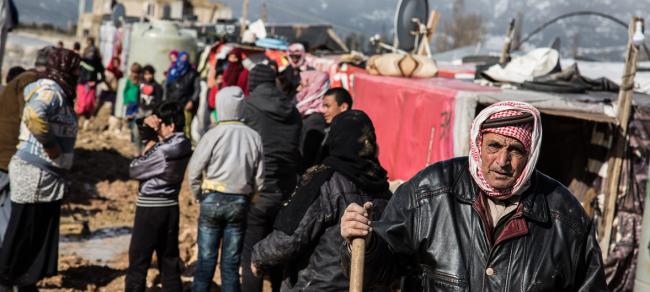
Storms and snow in Lebanon worsen plight for Syrian refugees
New York, Jan 11 (IBNS): Storm-force winds and snow across Lebanon have worsened the plight for tens of thousands of Syrian refugees who’ve been forced from their homes by nearly eight years of conflict, a top UN humanitarian official said on Thursday.
Speaking to journalists in Geneva, Philippe Lazzarini, Resident and Humanitarian Coordinator for Lebanon, said that refugees had been moved from shelters - including in the exposed Bekaa valley where wintery conditions are especially acute - to safer facilities, after Storm Norma hit at the weekend.
“Some of the settlements have been completely flooded, very cold, it’s extremely inclement conditions, and to describe daily life, it’s just miserable,” he said.
Around 70 per cent live under the poverty line, Lazzarini said, noting that this was in fact an improvement on 2017, when the number was even higher.Although the number of Syrian refugees officially hosted by Lebanon is more than 900,000, registration ended in 2014, and it is estimated that the real figure is between 1.2 and 1.3 million.
This high ratio of refugees to nationals – around one in four – would be “unthinkable and unacceptable” anywhere else, the UN official said, before playing down “tensions” between host Lebanese communities, 10 to 20 per cent of whom live below the poverty line.
Rejecting suggestions that the refugee situation alone was responsible for discontent within the country, the Resident and Humanitarian Coordinator noted that its leaders have been in “deadlock” and unable to agree on a power-sharing arrangement for effective central governance, despite elections last year.
“Today I would say there is an atmosphere of anxiety in the country which is very much related to the political deadlock,” he said. “The inability to put in place a cabinet, the inability to decide and put in place the long-overdue reform, combined with the economic situation, combined with the geo-politics in the region and the refugees.”
International support and solidarity for the Lebanon situation remains strong, Lazzarini insisted, amounting to up to $1.5 billion per year since 2015.
Nonetheless, he cautioned that eight years into the crisis, humanitarian funding “might have reached a ceiling” and that other longer-term development funding may need to be found, notably for education projects requiring a minimum four-year investment.
For returnees, ‘trust’ paramount
Asked about how many Syrian refugees have chosen to return to their war-scarred country, the UN official explained that only 16,000 to 17,000 registered with authorities in Damascus during 2018 – a slight increase on the previous year, when no more than 13,000 went home.
Suggestions that the UN had prevented people from doing so were incorrect, he insisted, noting that the organization ensured that returnees had all the “necessary documentation” they needed, such as birth and marriage certificates, to avoid difficulties reintegrating back into Syrian life.
“Ultimately people will decide if yes or not, if they are confident enough to return,” he said. “What’s important is, if returns are taking place, it takes place in an environment where people feel confident enough to go back and where you have the necessary trust.”
Latest UN figures indicate that there are more than 5.6 million Syrian refugees outside the war-torn country; Turkey hosts most, at 3.6 million.
Next is Lebanon, at more than 900,000, followed by Jordan (670,000), Iraq (250,000) and Egypt (130,000), while North Africa shelters 35,000.
UNICEF/UN0158355/Halldorsson
Support Our Journalism
We cannot do without you.. your contribution supports unbiased journalism
IBNS is not driven by any ism- not wokeism, not racism, not skewed secularism, not hyper right-wing or left liberal ideals, nor by any hardline religious beliefs or hyper nationalism. We want to serve you good old objective news, as they are. We do not judge or preach. We let people decide for themselves. We only try to present factual and well-sourced news.







